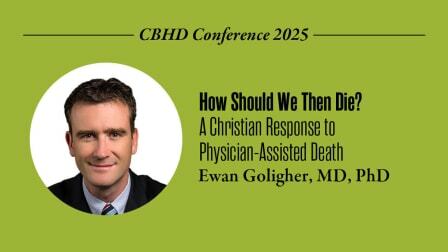How Should We Then Die?

Presented by Ewan Goligher, MD, PhD at the Center for Bioethics and Human DIgnity Conference, this summer (at Trinity Evangelical Divinity School - TEDS - in Illinois)
Physician-assisted death delineates the set of practices whereby a physician deliberately and intentionally acts to cause a patient’s death with their consent. It is rapidly gaining social and professional acceptance throughout the Western world and has been normalized in medical practice in countries like Canada, the Netherlands, Belgium, and elsewhere. Because it represents a sharp break from the Hippocratic tradition received and embraced by the Christian West, physician-assisted death constitutes a sea change in the mores of medicine. Death, like so many other things in consumerist societies, now comes to us as a matter of choice. In this lecture, we will explore the root causes of the growing demand for death on demand and offer reasons to resist this practice. These reasons concern the nature of the human person, the nature of human value, and the nature of human destiny.
The video is linked below.
For a sister topic to euthenasia (so called "good death"), check out Albert Mohler's discussion on eugenics (so called "good genes"), as he dives into the practice gaining ground. You can access Al's discussion by clicking --> here <-- (fast forward to the 10:06 mark in this video)
The discussion on euthenasia by Dr. Goligher is one that I would prioritize. This is something every Christian should seek to understand from a biblical perspective, because it is coming and it is deadly. The speaker talks about the three errors of eugenics as:
1. It opposes human dignity
2. It devalues the body, and
3. it falsely presumes that there is nothing after the grave - a completely unverifiable presumption
(actually, there is good evidence from numerous documented near death experiences that there, absolutely, is something after this life)
Dr. Goligher disccussed the theology of (a) the sacredness of the person, (b) the fact that we are embodied, (c) the fact that we are made incomplete - we need others, and (d) we have forgotten how to suffer.
It is a very good 33 minute watch!